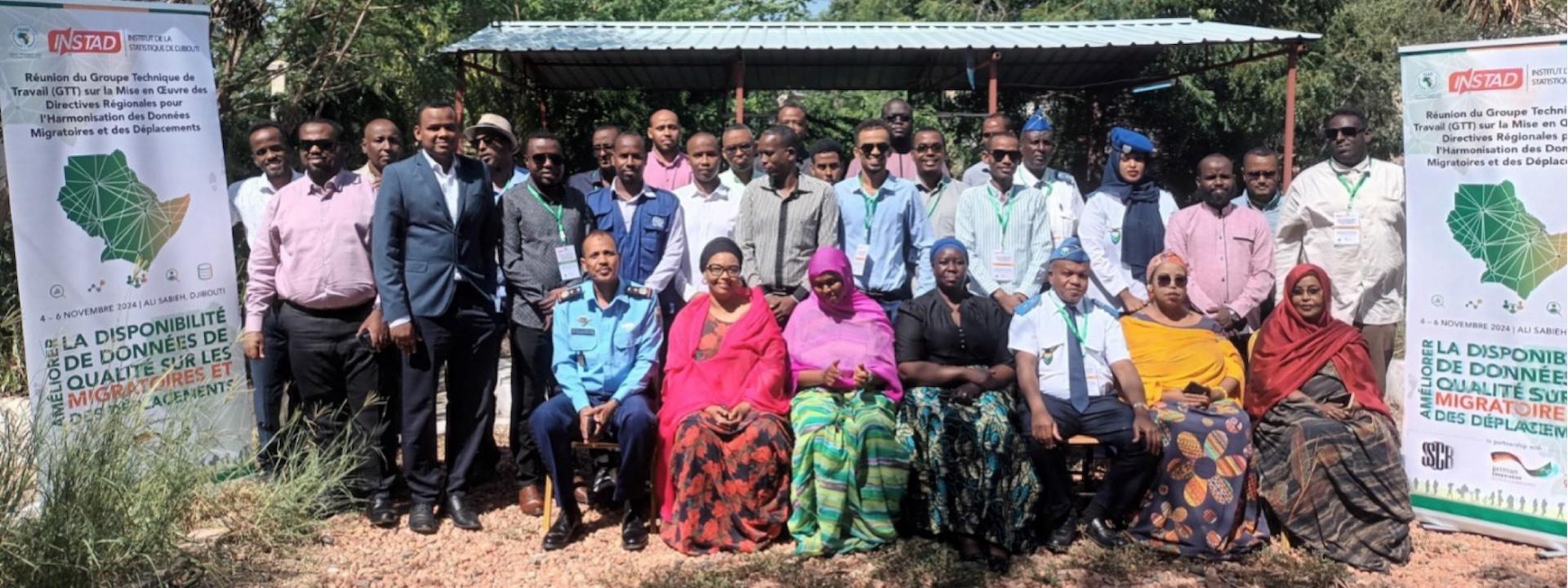November 7, 2024(Ali Sabieh, Djibouti): The Intergovernmental Authority on Development (IGAD) supported the government of Djibouti through the Institute of Statistics of Djibouti (INSTAD) to hold the 10th national coordination meeting on migration and displacement statistics. The coordination meeting brought together all stakeholders involved in generating the migration and displacement statistics to deliberate on the best way to address the challenges faced and continue coordinating amongst them to improve the availability and quality of migration statistics.
This three-day workshop aimed to improve the availability and quality of migration and displacement statistics in Djibouti, with key objectives being to promote the harmonization of migration and displacement data, raising awareness of regional migration and displacement data guidelines and strengthening the technical capacities of the institutions involved.
Representing Madam Fathia Alwan, Director of the Health and Social Development Division, Dr. Victoria Anib, Head of the Social Development Unit, emphasized that improving migration and displacement statistics is essential for informed decision-making. She stressed the importance of enhancing data production and quality, harmonizing methodologies and concepts to ensure consistency across IGAD Member States, and strengthening coordination at continental, regional, and national levels. Dr. Anib also highlighted the need to raise awareness of the critical role of accurate migration and displacement data in shaping effective policies and addressing regional migration challenges.
“We work toward a harmonized approach that improves data comparability across our region, promotes evidence-based decision-making, and strengthens our collective response to migration and displacement challenges,” Dr Victoria added.
In her opening remarks, Madam Saida Waberi Assoweh, Deputy Prefect of Ali Sabieh, commended the collaborative approach fostered by the Technical Working Group, describing it as a model of good governance and cooperation. She emphasized that this partnership will not only bolster Djibouti’s resilience to the challenges of migration and forced displacement but will also strengthen the entire IGAD region’s capacity to respond effectively to these issues.
“I would like to thank IGAD, Sweden Government, GIZ and Statistics Sweden for making this important workshop possible, not forgetting, of course, all the national institutions represented and our partners in the United Nations system for their unconditional support”, Madam Saida expressed.
The workshop convened diverse participants, including representatives from key national institutions—ministries, departments, and agencies overseeing migration issues—along with members of civil society organizations. IGAD Secretariat and international partners, including IOM and GIZ, also joined, bringing valuable expertise and support to strengthen collaborative efforts and enrich the discussions.
During the workshop, IGAD presented the contents of regional guidelines aimed at harmonizing migration and displacement data collection and management practices. The presentation emphasized how these guidelines will improve the coherence of regional responses and foster enhanced cooperation among Member States, ensuring a unified approach to addressing migration and displacement challenges.
The final day of the workshop was dedicated to reviewing a proposed action plan to implement the regional directives within the context of Djibouti. The action plan outlined clear objectives and focused on achieving concrete, tangible results, ensuring effective and practical application of the guidelines at the national level.
In conclusion, the workshop successfully fostered enhanced cooperation amongst the working group members, improving the exchange of migration information and strengthening responses to displacement crises. It also focused on building the technical capacities of participants in utilizing harmonized data collection and analysis tools. A key outcome was the commitment of the working group members to adopt standardized data management practices and systems, along with the development of concrete action plans for implementing the guidelines at the national level, complete with clear deadlines for execution.

